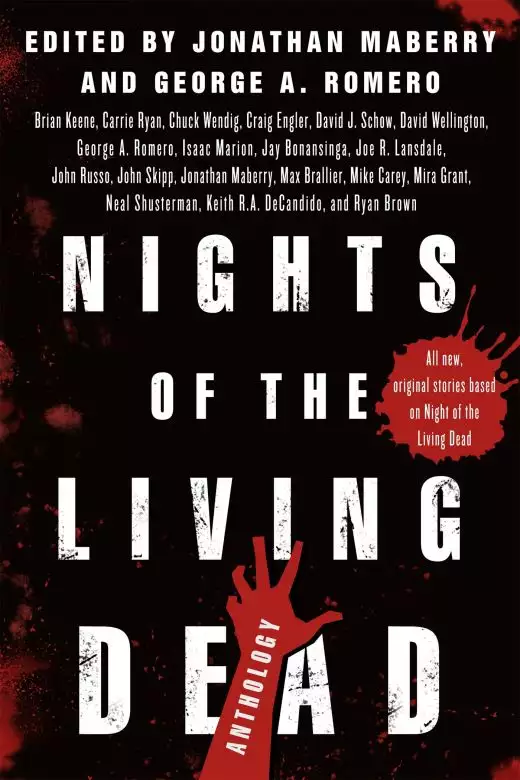NIGHTS OF THE LIVING DEAD
An Introduction
Fifty years ago I was able to convince several friends of mine that we might be able to make a movie … a real, honest-to-god motion picture, feature length.
We were in Pittsburgh, Pennsylvania, at the time. No one in Pittsburgh had ever made a movie before. Born and raised in New York City … (Parkchester, the Bronx) … I was around during those terrible days of gangs like the “Sharks” and the “Jets.” In my neighborhood, the “Golden Guineas” ruled the streets. This was an Italian gang. I was thought of as a “Spic.” So my ass was frequently kicked around.
My father was the greatest guy in the world. When I was comin’ up, he worked three jobs in order to “see me through.” (I was an only child.)
This “greatest guy in the world” considered himself to be a Castilian Spaniard. His family was from La Coruna. His mom and dad went to Cuba during its heyday. Finding success, they sent my father and his brothers to New York City. My father met a Lithuanian woman, Ann Dvorsky, and they married. I grew up speaking neither Spanish nor Lithuanian … strictly English … American English … New York English … Bronx English.
The Italians in the neighborhood spoke the same … Bronx English … but because of my name, Romero, they figured me to be a “Spic.” (These days, my name is often thought of as being Italian in origin. When I was comin’ up Cesar Romero was a big star. No question. I was a Latino.)
But I was only half Latino, right? And, according to my father, I had no Latino blood in me at all! Because, in those days, “Latino” meant “Puerto Rican.” To my embarrassment, my father, a Spaniard, refused to associate himself with those “bastard Puerto Ricans” who were turning New York into a “SEWER!”
So, as you might imagine, “labels” never meant very much to me.
When, years later, John Russo and I collaborated on the screenplay for my first film, we never described our principal character as being a man of color. In our minds, when we were writing the character, he was a “white guy.” An African American, Duane Jones, auditioned for the role and was, hands down, the best, within reach of our puny budget, to play it.
We didn’t change the script. Duane, himself, adjusted some of the dialogue to make the character seem a bit less “truck-driver gruff” than the way John and I had originally written him, but none of the story’s intentions were disturbed. The character of Ben met the same tragic end when, in our minds, he was white as he did when he became black. It was an “accident of birth,” so to speak.
* * *
When Russ Streiner and I were driving to New York with the very first print of Night of the Living Dead (then called Night of the Flesheaters) in the trunk of the car, we heard, somewhere along the Pennsylvania Turnpike, that Martin Luther King had been assassinated. After that … and forever after … our film has come to be viewed as a racial statement. We never intended “race” to be the film’s reason for being. We intended it to revolve around a small group of characters who, when caught in an extraordinary circumstance, find it impossible to reconcile their differences and, as a result, bring about their own demise.
To this day, I believe the film’s success to be largely a matter of misinterpretation. We got lucky. And our luck continues.
Zombies have earned a place among the “Famous Monsters of Filmland.” They’ve been around for a long time. I Walked with a Zombie, White Zombie, even Abbott and Costello met a zombie or two. When John and I were writing Night, we never thought of our “monsters” as “zombies.” We never called them zombies. In our minds, the dead were mysteriously coming back to life and eating the flesh of the living. We called them “ghouls.” Only after much had been written about Night being a “seminal” piece of cinema, and after hundreds of articles that referred to our creatures as “zombies,” did I concede the definition. Ten years after the release of Night, I wrote and directed a sequel, Dawn of the Dead, in which I first used the word “zombie.”
Today the zombie runs rampant through our popular culture. I am honored that I am considered to be the “godfather” of the zombie genre.
I can’t appropriately express how proud I am to be considered among so many greats who came before. I have devoted my life to film, and in that way I can feel justified for the kudos I’ve received over the years, but the title godfather of the zombie genre seems undeserved. It came to me as a stroke of luck.
Nonetheless, I love the genre and I always have. I feel privileged to be a participant. I feel privileged to have been asked to write this introduction to a collection of stories by authors who came to the genre not by accident but by design. I will forever be grateful for the curious circumstances that brought me to this position … one that enables me to present the works of all the worthy fiction writers whose names appear in the following pages.
—GEORGE A. ROMERO
Copyright © 2017 by Jonathan Maberry and George Romero
We hope you are enjoying the book so far. To continue reading...
Copyright © 2025 All Rights Reserved
